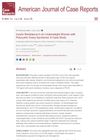 76 citations,
January 2007 in “American Journal of Clinical Dermatology”
76 citations,
January 2007 in “American Journal of Clinical Dermatology” Women with PCOS often have skin problems like excessive hair, acne, hair loss, and dark patches, which can be treated with hormonal and non-hormonal therapies.
 October 2023 in “Frontiers in endocrinology”
October 2023 in “Frontiers in endocrinology” Effective PCOS treatments require targeting specific signaling pathways.
 114 citations,
January 2014 in “World Journal of Gastroenterology”
114 citations,
January 2014 in “World Journal of Gastroenterology” People with PCOS, especially if obese, often have NAFLD, linked to obesity, insulin resistance, and high androgen levels.
 36 citations,
May 2021 in “Nutrients”
36 citations,
May 2021 in “Nutrients” Natural molecules like inositols, resveratrol, vitamins, and omega-3 fatty acids may help manage Polycystic Ovary Syndrome (PCOS), but their effects vary and need more exploration.
 17 citations,
September 2017 in “Journal of Cosmetic Dermatology”
17 citations,
September 2017 in “Journal of Cosmetic Dermatology” Women with PCOS in North China often have hirsutism and acne, with hirsutism linked to metabolic issues.
 February 2024 in “Journal of Education, Health and Sport”
February 2024 in “Journal of Education, Health and Sport” Different treatments for PCOS should be tailored to the individual, including lifestyle changes and various medications.
 March 2024 in “International journal of life-sciences scientific research/SSR Institute of International Journal of Life Sciences”
March 2024 in “International journal of life-sciences scientific research/SSR Institute of International Journal of Life Sciences” PCOS has many symptoms, with high androgen levels being the most common.
 2 citations,
January 2023 in “Research Square (Research Square)”
2 citations,
January 2023 in “Research Square (Research Square)” Managing emotional distress, obesity, insulin resistance, and high male hormones is crucial for improving well-being in women with PCOS.
 5 citations,
January 2020 in “Bioscience Reports”
5 citations,
January 2020 in “Bioscience Reports” Certain changes in the VEGF gene can increase or decrease the risk of polycystic ovary syndrome.
 1 citations,
September 2019 in “Journal of surgery and medicine”
1 citations,
September 2019 in “Journal of surgery and medicine” People with polycystic ovary syndrome have worse meibomian gland and ocular surface conditions.
 December 2024 in “American Journal of Case Reports”
December 2024 in “American Journal of Case Reports” Underweight women with PCOS can have insulin resistance, and treatment with metformin and dexamethasone can improve symptoms.
 135 citations,
April 2017 in “Advances in Clinical and Experimental Medicine”
135 citations,
April 2017 in “Advances in Clinical and Experimental Medicine” New treatments for PCOS show promise, including both medication and non-medication options.
 26 citations,
February 2011 in “Anais Brasileiros De Dermatologia”
26 citations,
February 2011 in “Anais Brasileiros De Dermatologia” Polycystic Ovary Syndrome can cause hair loss and skin issues, and early treatment is important for preventing complications.
16 citations,
September 1990 in “Fertility and sterility” Ketoconazole can treat ovarian hyperandrogenism but should be used cautiously with monitoring and birth control.
 9 citations,
May 2021 in “Frontiers in Cell and Developmental Biology”
9 citations,
May 2021 in “Frontiers in Cell and Developmental Biology” DNA methylation changes in women with PCOS could be used as disease markers and suggest new treatment targets.
 7 citations,
August 2019 in “Endokrynologia Polska”
7 citations,
August 2019 in “Endokrynologia Polska” The free androgen index varies among women with different types of PCOS.
 1 citations,
August 2023 in “Diagnostics”
1 citations,
August 2023 in “Diagnostics” Women with PCOS are more likely to develop kidney stones, especially those with certain PCOS types.
 1 citations,
April 2022 in “Annals Academy of Medicine Singapore”
1 citations,
April 2022 in “Annals Academy of Medicine Singapore” PCOS care in Singapore can be bettered by refining referral systems, standardizing diagnosis and treatment, enhancing complication screening, and offering educational resources for clinicians.
 1 citations,
May 2020 in “Journal of The American Academy of Dermatology”
1 citations,
May 2020 in “Journal of The American Academy of Dermatology” Women with hair loss should be checked for PCOS, as it's often related and early diagnosis can help with treatment.
December 2024 in “Journal of Clinical Medicine” PCOS and eating disorders are linked by hormonal imbalances, needing personalized treatment.

Benign ovarian tumors can cause excess male hormones and related conditions in postmenopausal women.
 December 2023 in “Current psychosomatic research”
December 2023 in “Current psychosomatic research” Psychological interventions can improve the quality of life for women with PCOS.
 August 2023 in “Journal of Clinical Medicine”
August 2023 in “Journal of Clinical Medicine” Metformin lowers prolactin in women without PCOS but not in those with PCOS, where it reduces other hormones instead.
 January 2020 in “Asian Journal of Basic Science & Research”
January 2020 in “Asian Journal of Basic Science & Research” Nutrease powder, a high-protein, low-carb supplement, can help manage Polycystic Ovary Syndrome symptoms, regulate periods, improve ovulation, and restore fertility.
January 2008 in “Humana Press eBooks” Women with PCOS have higher risks of heart disease, type 2 diabetes, and endometrial cancer.
1947 citations,
September 1995 in “New England journal of medicine/The New England journal of medicine” PCOS is a common hormonal disorder causing irregular periods and increased hair growth, linked to insulin resistance and long-term health issues.
 352 citations,
January 2006 in “The Journal of Clinical Endocrinology and Metabolism”
352 citations,
January 2006 in “The Journal of Clinical Endocrinology and Metabolism” Most women referred for excess male hormone symptoms had polycystic ovary syndrome (PCOS), with other conditions being less common.
 36 citations,
October 2021 in “Frontiers in Endocrinology”
36 citations,
October 2021 in “Frontiers in Endocrinology” Insulin resistance and high male hormone levels are major causes of Polycystic Ovary Syndrome.
 27 citations,
May 2002 in “The Journal of Clinical Endocrinology & Metabolism”
27 citations,
May 2002 in “The Journal of Clinical Endocrinology & Metabolism” Brothers of women with PCOS tend to have higher levels of a hormone called DHEAS, indicating a possible genetic link.
26 citations,
January 2016 in “Indian journal of endocrinology and metabolism” Both metformin and pioglitazone improve PCOS symptoms, but pioglitazone is a good alternative for those who can't take metformin.

























